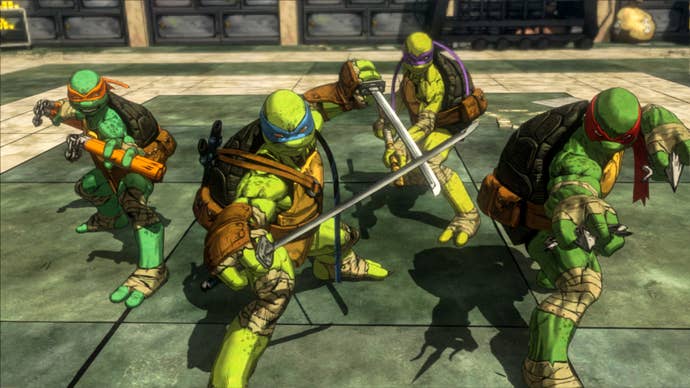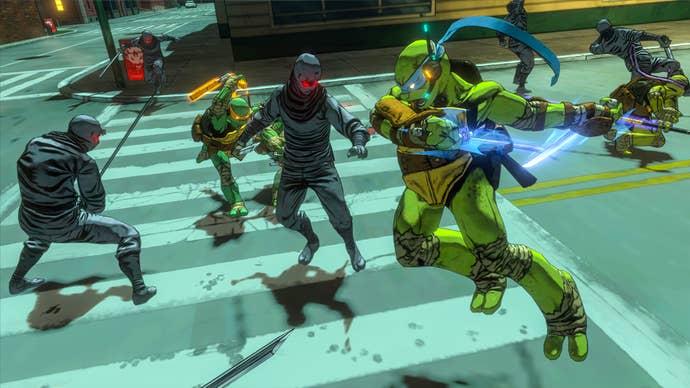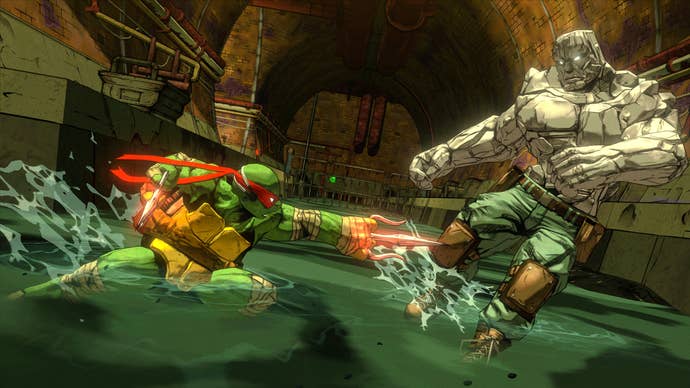Teenage Mutant Ninja Turtles: Mutants in Manhattan PlayStation 4 Review: Extra Cheese
Platinum Games' newest work-for-hire project has its bright moments, but ultimately amounts to the video game equivalent of Little Caesars.
This article first appeared on USgamer, a partner publication of VG247. Some content, such as this article, has been migrated to VG247 for posterity after USgamer's closure - but it has not been edited or further vetted by the VG247 team.
The licensed console game—once the bane of game critic and consumer alike—has become an endangered species in recent years.
Licensed games still exist, mind you, but they've all migrated to mobile platforms: where the investment is much lower, and the returns (potentially) much higher. It says a lot about the state of modern gaming that the Marvel cinematic universe—a gargantuan franchise that's essentially taken over an entire medium—hasn't even attempted to replicate that same success in the world of consoles. So it's surprising to see something like Teenage Mutant Ninja Turtles: Mutants in Manhattan pop up: Not only is it a full-price retail release, it's also made by Platinum Games, a studio known for a certain standard of quality. But while the state of the licensed game has changed, some things haven't—namely, the "good enough" sentiment baked into a product designed to sell based on its IP alone.

At its core, TMNT: Mutants in Manhattan plays a bit like a mish-mash of several Platinum games, though without the level of depth you'd find in something like Bayonetta. Outside of these influences, it's a fairly simple brawler that borrows from Dynasty Warriors' playbook: For the most part, you vary between weak and strong attacks, and unleash one of four super moves once they charge up. True to Platinum's house style, Mutants in Manhattan offers a parry move that lets you circle around behind enemies or counterattack if you launch the ability right before the enemy strikes. Outside of the trickier enemies and bosses, though, it's typically easier to mindlessly slash your way through foes instead of relying on more defensive measures.
Mutants in Manhattan breaks up its levels up into two distinct types. The large, outdoor arenas definitely host the game's best moments, and even feel a bit like Crackdown as you bound up buildings and glide across cityscapes as April O'Neil fills you in on different objectives. The linear, enclosed, and mostly underground levels are home to Mutants in Manhattan's dullest moments, mostly due to the drab aesthetics and cut-and-paste level design. Platinum tries to keep the player entertained by giving players a variety of things to do—protecting locations, disarming bombs, hacking computers—but whenever Mutants and Manhattan traps you underground, it's hard to not yearn for those freer moments.

Each level culminates in a boss battle, which is kinda where everything falls apart. To be honest, I expect a lot from Platinum when it comes to designing boss battles, but each one in Mutants in Manhattan feels like a chaotic war of attrition where you eventually grow bored of whittling down seven health bars. And the AI of the other three Turtles does its best to make things more annoying, as their lack of a self-preservation instinct can lead to some cheap deaths. To its credit, Mutants in Manhattan tries to keep things fair: If a character loses all of their health, you have a brief window of time to revive them before they're temporarily removed from the current level.
The problem, then, comes when the dim-witted AI doesn't avoid powerful area-of-effect attacks, leaving you as the last Turtle standing before your formerly dead partners can rejoin the game. I fought the second form of a particularly tough boss multiple times, only to have my entire team wiped out by the same attack over and over again. Of course, Mutants in Manhattan features an online multiplayer mode—meaning you can play with other Turtles who presumably aren't as brain-dead—but still, the AI should be competent enough to at least try to avoid enemy attacks.

As with most Platinum Games, Mutants in Manhattan offers a fairly short campaign that's meant to be replayed over and over for the sake of performing better and upgrading your Turtles' abilities even further. Each of the four special moves they can equip—which range from healing to powerful attacks to other buffs—can be levelled up individually, and the Turtles can even share them without having to level up their own version of said move. They can also equip a charm (more on higher difficulties) which gives their weapons passive buffs, like the chance to poison or to collect more drops from enemies. Regardless of your Turtle loadout, though, the way you interact with enemies won't change much.
Even if I still don't expect much from licensed games, the mediocrity of Mutants in Manhattan stings a little more since I'm well aware Platinum Games can do much better. If they had the time and money to, say, cram the game full of unique and dazzling set pieces a la Bayonetta 2, this could be a much, much better game. But they did the best with what they had, which clearly wasn't very much. If you're looking for a similarly repetitive experience with the Ninja Turtles—and one that will last you all of an hour—you might be better off jumping back to the Konami arcade classics of the '90s.
InterfaceMutants in Manhattan's intuitive UI makes using items and issuing commands to your fellow Turtles fairly simple.
Lasting AppealThe journey from beginning to end may only take a few afternoons, but Mutants in Manhattan incentivizes replaying older levels with an assortment of unlockables.
SoundThe fairly generic rock soundtrack doesn't annoy, but it also doesn't stand out very much.
VisualsWhile the environments are somewhat bland, Mutants in Manhattan's visuals a good job of capturing the characters themselves.
ConclusionThe Platinum spark exists in Mutants in Manhattan, which is why it's tragic the developers couldn't spend the same resources they would on original IP like Bayonetta. As licensed games go, you could do much worse, but this TMNT outing feels like a collection of good ideas in need of a second pass.
